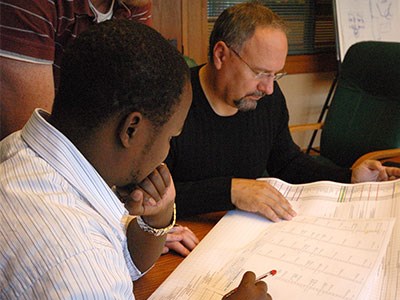Foreign-trained professionals and tradespeople have a new avenue to advance their careers by improving their language skills.
North Bay's Canadore College is offering a new English as a Second Language bridge training program geared to newcomers to Canada working in mining-related fields.
The trades and professions covered under the program are civil engineers, civil engineering technicians, welders/fitters, electricians, machinists, plumbers, and heavy truck mechanics.
“We're always trying to fill new needs,” said Laurie Siviter, the college's project leader of quality learning, teaching and innovation.
“There are a number of English as a Second Language programs available at our (college) and elsewhere, but occasionally a need for occupational-specific language training comes up.”
Bridge training programs are designed to help internationally trained individuals move quickly into the labour market through assessment of their individual skills and competencies, and providing the required training for the workplace.
To Siviter's knowledge, Canadore is the only Canadian college that offers such training for mining professionals and trades.
“There are terms used in mining that are specific to that industry. If an employee is looking for advancement and they get occupational-specific language training then they can really fast-track.”
To be eligible for the program, enrollees must hold a post-secondary degree or trade certificate from outside Canada. Participants need at least two years of work experience and must speak a fair bit of English, categorized as Canadian Language Benchmark 7.
“They have to come into this program by already being workplace ready, but it's just the language skills that are probably holding them back,” said Siviter.
Canadore's program provides 12 courses to increase proficiency in oral skills, occupational-specific vocabulary, the ability to understand safety instructions, and to increase comfort and confidence in everyday situations.
The students basically learn at their own pace by taking classes on campus or by studying online.
“We do a needs assessment to find out what courses would best benefit them and we tailor the curriculum specific to the student,” said Siviter. “Every student is following their own plan to get them where they need to be to be successful.”
The instruction is offered by faculty with input from local industry to ensure the content follows national occupational standards for the mining industry.
The cost for the 12-course package is $3,000. Individual courses are $250.
“For the amount of direct student contact they get, it's really good value for the money,” said Siviter.
Government funding is available to companies to offset these training costs.
Siviter said what they've discovered is that, beyond just learning industry lingo, students need to learn the “soft skills” of so- called water cooler talk. It gets them better acclimatized to their new workplace and helps them build better relationships by being able to casually chat with co-workers.
“The softer skills allow them to feel more connected to the workplace. We look at all aspects of their language skills.”
About a dozen students have come through the program, all sponsored by local companies, but Siviter hopes to expand Canadore's reach by connecting with more front-line immigrants at upcoming job fairs in the Toronto area.
“We're hoping to do assessments and talk to a lot of immigrants in southern Ontario that are looking toward the mining industry in the North because there are positions that are available.”
For one North Bay mine building company, the program is potentially a great recruiting tool.
Cementation Canada has enrolled two foreign-trained engineers of Chinese descent in the program who were struggling with their communication skills.
Jean-Paul Chiasson, general manager of engineering, said their individual difficulties were creating “a bit of an impediment” in making themselves understood.
“We decided to see what was out there by way of assistance and sure enough there was a program here in town that was perfect.”
Chiasson said achieving a proficiency in English does factor into newcomers having their foreign credentials recognized.
Professional Engineers Ontario (PEO), the provincial regulatory body that licences engineers, requires that all immigrant applicants must demonstrate good English language skills in the overall process of assessing their academic qualifications to work in Canada.
“They will do an interview with an individual where they are essentially checking the language skills to some degree,” said Chiasson. “I can see that a program like this will certainly be beneficial for people going through the process.”
Both employees have completed one training module on oral skills and he's recommending that they participate in a second on writing.
But Chiasson has noticed the dramatic progress both employees are making.
“There's a stronger use of the (industry) vernacular. There's definitely an improvement.”
Chiasson acknowledges said the Canadore program could be useful in attracting more newcomers.
“This is something I'm still learning about and now that I've been exposed to this program, and I know more about it, I would say that this would at least give me another avenue for recruiting people and bringing them aboard.
“I think it's a great program and I know we'll be using it again in the future.” www.canadorecollege.ca/Bridge-Training




